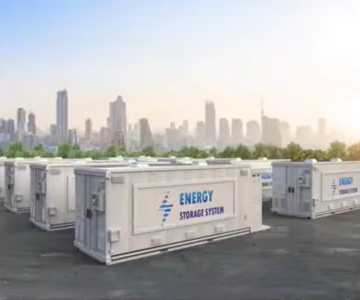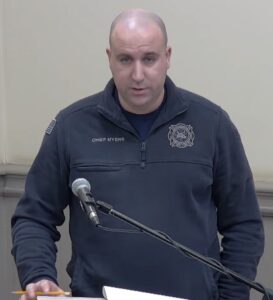ISO In Crosshairs As Energy Plans Shift
Republican state senators want Gov. Kathy Hochul to declare an energy state of emergency and halt the state’s Climate Leadership and Community Protection Act mandates.
One reason for Republicans’ concern is the recent energy warning from the New York State Independent System Operator during a late June heat wave and the ISO’s warnings of possible power shortfalls if fossil fuel plants are taken offline too soon.
“The recent energy warning during the recent heatwave is a wake-up call Albany must not ignore,” said Sen. Mario Mattera, R-Smithtown and ranking minority member of the Senate Energy and Telecommunications Committee. “New Yorkers were told to conserve power because our grid couldn’t handle the demand but Albany Democrats continue to push extreme, unrealistic and unfunded energy mandates that eliminate reliable fuel sources without a reliable and realistic replacement. This is exactly what we have continually warned about and the main reason we need an energy policy grounded in reality, not ideology. That means protecting fuel choice, investing in clean natural gas, and examining other forms of energy without putting costly unfunded mandates on our residents and businesses.”
The Republican senators’ letter also calls on Hochul to use her executive authority to suspend laws enacted under the Climate Leadership and Community Protection Act that have placed more demand on the grid and more of a financial burden on New Yorkers – including electric vehicle and bus mandates, bans on natural gas hookups, the repeal of the “100 foot rule” and the Cap and Invest program. Just last week, the Governor admitted that it is impossible to achieve the current objectives of the CLCPA without hurting ratepayers, and the president of NYSERDA pointed to the need for an updated energy plan that continues to include fossil fuels.
Both Hochul and Doreen Harris, president and CEO of NYSERDA, have said recently that the state is changing its energy plans over concerns the state can’t meet the CLCPA’s mandates without hurting utility ratepayers. Hochul spoke to WGRZ about the issue while Harris told Spectrum News’ Capitol Tonight the state’s new draft energy plan includes the possibility the state can meet the CLCPA as well as challenges the law is facing, including roadblocks at the federal level. A new state energy plan will be issued this summer.
Environmental advocates, on the other hand, say the ISO’s latest annual summary Power Trends report misleads the public and policymakers about the state’s need for more fossil fuel generation. The groups are calling on Governor Hochul, Public Service Commission Chair Rory Christian, Department of Environmental Commission Commissioner Amanda Lefton, and New York State Research and Development Authority President Doreen Harris to scrutinize NYISO’s actions and narratives, and to push for and prioritize systemic reforms that will accelerate the transition to affordable, reliable, renewable energy.
Since 2021 NYISO reliability reports have noted that reliability margins are declining – including projected shortfalls starting this year in New York City with the pending retirement of several peaker plants that were to be taken offline. Those plants remain online until the Champlain Hudson Power Express transmission line from Quebec, Canada, to New York City is completed in 2026. Another reliability need was identified in the summer of 2033, but a decrease in projected demand has eliminated that shortfall for now.
Current statewide reliability margins in winter are sufficient, according to the most recent ISO Power Trends report, but if gas-fired generators cannot secure fuel during peak winter demand periods, statewide deficiencies could arise as soon as winter 2029-2030 under normal weather conditions.
The group of environmental advocates say none of the earlier NYISO reports on which the most recent Power Trends report bases its analysis concluded that fossil fuel generation is necessary for grid reliability or that repowering aging gas plants is beneficial. The advocates say the ISO reports have also said there is growing unreliability of gas-fired power, noting aging plants are breaking down more often, have high costs and are not reliable for winter peak demands.
“By publishing this misleading summary Power Trends report, NYISO is standing in the way of the clean energy transition New Yorkers need and the law requires,” said Rachel Spector, Deputy Managing Attorney for the Northeast Regional Office at Earthjustice. “NYISO’s failure to prepare the grid for a clean energy future is putting our climate goals, our wallets, and our health at risk. We urge state leaders to take a hard look at NYISO’s track record and misleading messaging – and to act swiftly to remove the barriers standing in the way of New York’s clean energy progress.”
Power Trends 2025 details how reliability margins continue to decline as fossil-based generation retires and new supply resources are not keeping pace with expected demand growth. Further, the report examines the impact on the electric system from an increase in large loads, such as semiconductor manufacturing, generative AI and data center projects.
The ISO’s short-term cure is to repower aging or perhaps shuttered fossil fuel plants. Among the issues the ISO forecasts in coming years is generator deactivations outpacing new supply additions. Electrification programs and new large-load customers associated with economic development initiatives are pushing projected demand higher. Together, these forces are also narrowing reliability margins across New York and increasing the risk of future reliability needs.
At the same time, Gov. Kathy Hochul is calling on investment in at least one upstate nuclear plant that state Sen. George Borrello and Dunkirk Mayor Kate Dowiasz want to see placed in Dunkirk at the site of the mothballed NRG plant.
“Simply put, as New York seeks to retire more fossil fuel units in the coming years it will be essential to deploy new energy resources with the same reliability attributes to maintain grid reliability. Until new, non-emitting alternatives like hydrogen or advanced nuclear generation are developed and commercialized, fossil resources are needed to fill an essential role in preserving reliable grid operations,” the Power Trend 2025 report states.





